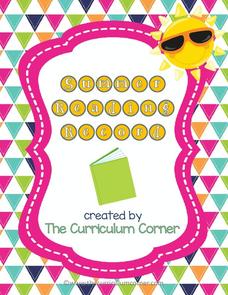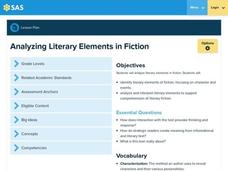EdHelper
George Washington's Socks by Elvira Woodruff
A solid, straightforward book report form is an excellent addition to your literature unit. Class members note the main characters, point of view, plot elements, and other important details from a story, adding their favorite part...
Museum of Disability
Ian’s Walk and Apples for Cheyenne
Help young learners understand friendship and empathy with two reading comprehension lessons. Each lesson focuses on a story about a child with autism, and encourages readers to compare and contrast the characters to each other and to...
Roald Dahl
Matilda - Miss Honey and The Trunchbull
As the instructor reads aloud several quotes from five chapters of the story Matilda, class members mime their interpretation of the scenes. Then, after reading "Miss Honey" and "The Trenchbull" (chapters seven and eight), the...
Curriculum Corner
Summer Reading Record
No more summer reading lag! Give young readers a set of graphic organizers and worksheets to keep track of the books they read over the summer and to keep reading comprehension skills fresh. The graphic organizers include identifying...
Curated OER
Antagonist
Young learners explore the antagonist. They retell Hansel and Gretel and identify the witch and the stepmother as antagonists. They then brainstorm common character traits of an antagonist, and then write a paragraph describing...
Curated OER
Reading Report
In this reading worksheet, young scholars describe two characters from their book. Students also include the book's title and author as well as their own start and end date.
Curated OER
Awesome Allegories
Studenets are told that Peter Paul Rubens was born on June 28, 1577, in Siegen, Germany. They create their own allegorical painting, think of a favorite story. Students write a summary of one scene in that story, using Crayola Erasable...
Laura Candler
Bio Poems Made Easy
A creative way bring autobiographical writing to your poetry unit or back-to-school curriculum, this lesson plan guides you through a bio poem activity. Kids use the graphic organizer to describe themselves using adjectives, things...
Reed Novel Studies
Runaway Ralph: Novel Study
Maybe the grass isn't always greener on the other side. Ralph, a mouse character in Runaway Ralph, thought that summer camp had to be better than dealing with his mother, uncle, and cousins. However, camp has its troubles, too. Worksheet...
Polk Bros Foundation
I Can Infer Motive and Effects for an Action
Help your pupils determine just what makes a character or person tick by zooming in on one character or person. This graphic organizer is dedicated to analyzing one person and asks pupils to infer a personality trait, note down an action...
Curated OER
Inferring Character Traits
Here is a lesson which is "flexible," and can operate as an individual or whole class activity. After reading a book of their choosing, with the use of a semantic map, learners identify character traits. They infer how their feelings...
Curated OER
The Legend of the Indian Paintbrush
Third graders complete activities for the book The Legend of the Indian Paintbrush, by Tomie dePaola. In this literature lesson plan, the students read the story and summarize the main events. They look for story elements focusing on the...
Curated OER
Introduction to Little House Books
Third graders identify the main characters in the Ingalls family and describe the relationships between the characters. They locate the setting of the book on a map of the Upper Mid- West. Students understand that the books are set in...
Curated OER
Imaginative Power - Exploring Superheroes
Third graders identify super human powers and their uses found in comic and cartoon characters, identify use of visual elements such as line, shape, and color, and create drawings of an original super character with at least two extra...
Curated OER
Sam and the Lucky Money
Third graders read the story "Sam and the Lucky Money". Individually, they identify new key terms from the story. In groups, they examine the setting and discuss how it relates to the plots and characters. To end the lesson, they read...
Curated OER
Story Creation Magic: Character, Setting, Plot
Students review the terms plot, setting, and characters and examine how all of these elements are needed to make a story. They are given parts of stories and they try to identify all of those parts of the story.
Curated OER
Describing Family - Lesson Plan
Young scholars describe their family in their new language French. They use adjectives, and proper gender. Then they describe how the family is alike and different.
Curated OER
Eyes That Talk
Students explore their personal strengths and characteristics and write a short description of themselves. Afterward, they create a dramatic self-portrait with an expression that identifies who they are. Students fill the areas around...
Teachit
Keeping a Reader's Journal
A reader's journal can help pupils comprehend, connect to, and remember a text. Have them follow the prompts here to write journal entries for any literary text.
Pennsylvania Department of Education
Analyzing Literary Elements in Fiction
Students analyze the characters and events in fictional writing. In this literary elements lesson, students study the meaning of the words characterization and fiction. They listen to the story Pigsty by Mark Teague, or any other book...
Curated OER
Comic Theater
Young scholars explore stock characters and pantomime. In this comic theater lesson, students examine an ancient Greek statuette depicting a comic actor and an ancient Roman lamp decorated with a comic mask. Young scholars pantomime...
Curated OER
Let's Retell a Story
In this retelling a story worksheet, students review and discuss all the components involved in retelling a familiar story. Students choose a favorite story/book and fill out a graphic organizer retelling it in their own words. Students...
Curated OER
Characters: People and Feelings
In this character worksheet, students read sentences, then choose the word in a pair that correctly describes the feeling in the sentences. One example is completed for students.
EngageNY
Close Reading of Thank You, Mr. Falker: Identifying the Superpowers of Reading
Third graders read excepts from the story, Thank You, Mr. Falker in order to gain practice in understanding an unfamiliar story by focusing on the details. They use a worksheet, embedded in the plan, which directs them to certain...























